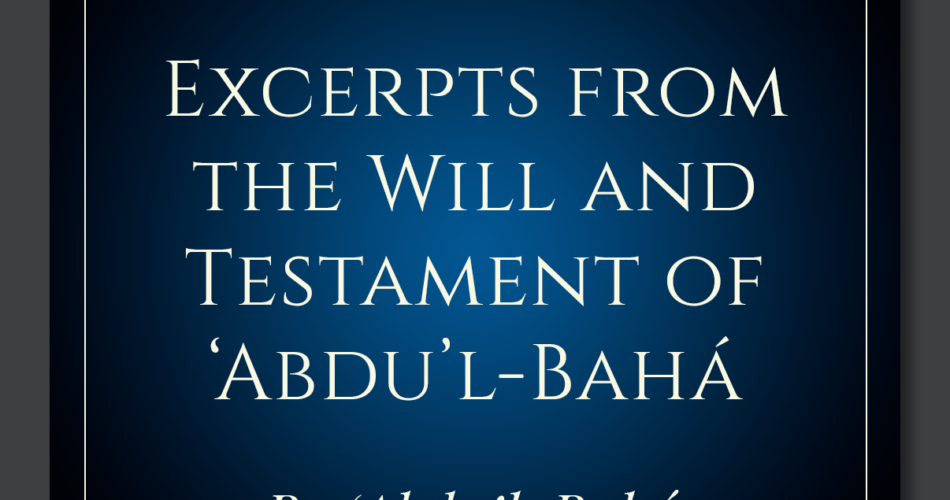Salutation and praise, blessing and glory rest upon that primal branch of the Divine and Sacred Lote-Tree, grown out, blest, tender, verdant and flourishing from the Twin Holy Trees; the most wondrous, unique and priceless pearl that doth gleam from out the Twin surging seas . . .
O my loving friends! After the passing away of this wronged one, it is incumbent upon the Aghṣán (Branches), the Afnán (Twigs) of the Sacred Lote-Tree, the Hands (pillars) of the Cause of God and the loved ones of the Abhá Beauty to turn unto Shoghi Effendi—the youthful branch branched from the two hallowed and sacred Lote-Trees and the fruit grown from the union of the two offshoots of the Tree of Holiness,—as he is the sign of God, the chosen branch, the Guardian of the Cause of God, he unto whom all the Aghṣán, the Afnán, the Hands of the Cause of God and His loved ones must turn. He is the expounder of the words of God and after him will succeed the first-born of his lineal descendents. . . .
O ye the faithful loved ones of ‘Abdu’l‑Bahá! It is incumbent upon you to take the greatest care of Shoghi Effendi, the twig that hath branched from and the fruit given forth by the two hallowed and Divine Lote-Trees, that no dust of despondency and sorrow may stain his radiant nature, that day by day he may wax greater in happiness, in joy and spirituality, and may grow to become even as a fruitful tree.
‘Abdu’l-Bahá
وَالتَّحِيَّةُ وَالثَّنَاءُ وَالصَّلَاةُ وَالْبَهَاءُ عَلَى أَوَّلِ غُصْنٍ مُبَارَكٍ خَضِلٍ نَضِرٍ رَيَّانٍ مِنَ السِّدْرَةِ الْمُقَدَّسَةِ الرَّحْمَانِيَّةِ مُنْشَعِبٍ مِنْ كِلْتَيِ الشَّجَرَتَيْنِ الرَّبَّانِيَّتَيْنِ وَأَبْدَعِ جَوْهَرَةٍ فَريدَةٍ عَصْمَاءَ تَتَلأْلَأُ مِنْ خِلَالِ البَحْرَيْنِ الْمُتَلَاطِمَيْنِ
ای یارانِ مهربان بعد از مفقودیِ این مظلوم باید اغصان و افنانِ سدرۀ مبارکه و ایادیِ امر الله و احبّایِ جمالِ ابهی توجّه بفرعِ دو سدره که از دو شجرۀ مقدّسۀ مبارکه انبات شده و از اقترانِ دو فرعِ دوحۀ رحمانیّه بوجود آمده یعنی شوقی افندی نمایند زیرا آیت الله و غصنِ ممتاز و ولیِّ امر الله و مرجعِ جمیعِ اغصان و افنان و ایادیِ امر الله و احبّاء الله است و مبیّنِ آیات الله و مِن بَعْدِهِ بِکْراً بَعْدَ بِکْرٍ یعنی در سلالۀ او
ای یارانِ باوفایِ عبدالبهاء باید فرعِ دو شجرۀ مبارکه و ثمرۀ دو سدرۀ رحمانیّه شوقی افندی را نهایتِ مواظبت نمائید که غبارِ کدر و حزنی بر خاطرِ نورانیش ننشیند و روز بروز فرح و سرور و روحانیّتش زیاده گردد تا شجرۀ بارور شود
حضرت عبدالبهاء
To commemorate the imminently approaching centenary of the passing of ‘Abdu’l-Bahá, the Utterance Project is delighted to publish this video, our second-to-last publication in the Centenary Collection, consisting of three passages from ‘Abdu’l-Bahá’s Will and Testament—a vital document in which ‘Abdu’l-Bahá ensured the continuity of the Bahá’í Faith by explicitly appointing His grandson, Shoghi Effendi, as His successor and the interpreter of the words of the Central Figures (the Báb, Bahá’u’lláh, and ‘Abdu’l-Bahá Himself). The first two passages are taken from Part One of the Will and Testament, and the third from Part Three.
The phrase translated as “the unique and priceless pearl”—a reference to Shoghi Effendi that inspired the title of the well-known account of his life, The Priceless Pearl, written by his wife, Hand of the Cause of God Rúḥíyyih Khánum—is jawharatin farídatin ‘aṣmá’ in the original Arabic: jawhar meaning “pearl,” faríd meaning “unique,” and ‘aṣmá’ meaning “priceless.”
We chose these three excerpts specifically because, a mere few days before the celebration of the Holy Day dedicated to the Covenant, they offer all Bahá’ís an opportunity to learn the terms central to the Covenant of Bahá’u’lláh in their original Arabic and Persian—terms like “the Twin Holy Trees” (shajaratayni’r-rabbáníyyatayn), “the Hands of the Cause of God” (ayádíy-i-amru’lláh), “the Sign of God” (áyatu’lláh), “the Guardian of the Cause of God” (valíyy-i-amru’lláh), and “the expounder of the words of God” (mubayyin-i-áyátu’lláh).
The “-ayn” suffix appended to many of the words in the opening Arabic verses are dual markers. In Classical Arabic, nouns and verbs are conjugated in a special dual form if they refer specifically to two people or things.
Original Sources
Further References
